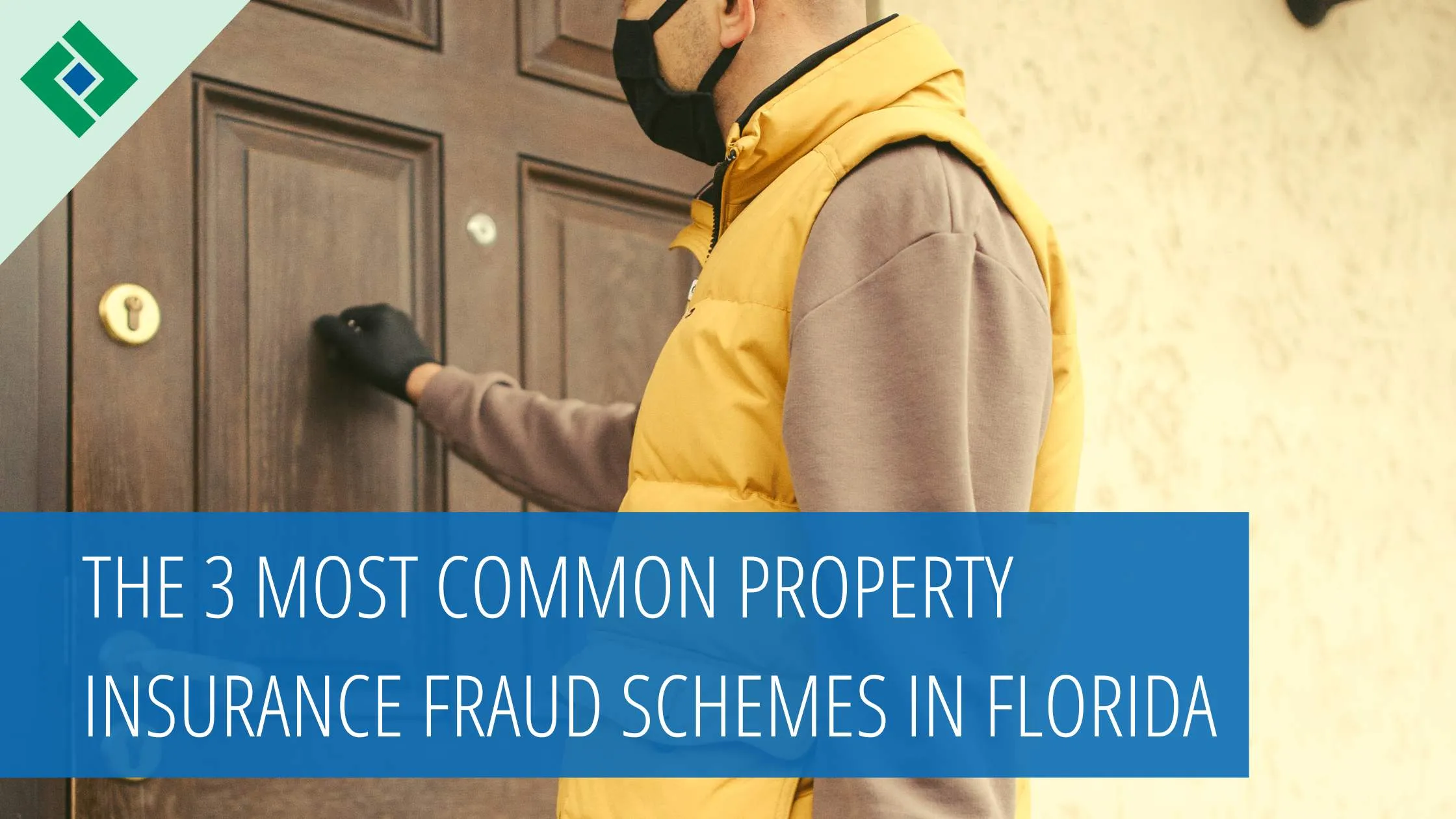The 3 Most Common Property Insurance Fraud Schemes in Florida

Fraud is a leading contributor to the current homeowners insurance crisis in Florida. In addition, severe weather events in recent years – including Hurricane Ian, the costliest storm the state has experienced to date – along with increased construction costs and inflation have only served to exacerbate the problem.
Insurance fraud impacts everyone: homeowners, insurers, and the state. It's why the Florida Legislature is considering an array of legislative initiatives in 2024 in an attempt to help curb fraud and the high cost of insurance premiums in the state.
In the majority of instances, insurance fraud involves submitting false or exaggerated claims to an insurer to receive an otherwise unwarranted payout. The following are the three most common types of insurance fraud prevalent in Florida today.
1. Fraudulent Roof Repair Schemes
Often, scammers will pose as legitimate contractors or repair personnel. They may make all types of promises to you, such as:
- “You won’t have to pay a dime.”
- “If you sign up today, I can offer you a deal you won’t get anywhere else.”
- “We can start working on your roof immediately.”
- “We’ve got extra materials we can offer to you at a discounted price.”
- “You can get it for a bargain, if you pay in advance.”
- “We’ll cover your insurance deductible for you.”
In these cases, a fraudster tries to pressure you into signing a contract with them – and they may tell you exactly what you want to hear to seal the deal. Don’t fall for it.
Unlicensed contractors/repairmen may take your money and run, leaving shoddy work in their wake, or not doing the work at all. They may even have fabricated the need for the work/repairs or declared the damage much worse than it actually is. This type of insurance fraud most frequently occurs after a hurricane or storm has impacted homes in your area. It is also called contractor fraud or disaster fraud.
2. Assignment of Benefits (AOB) Fraud
Sometimes, unethical contractors may ask a homeowner to sign over their insurance benefits, which allows these contractors to collect claim payments directly from insurers. these contractors will then falsify or exaggerate claims and, if not paid, will file lawsuits against the insurer without the knowledge or consent of the policyholder.
These assignment of benefits (AOBs) are no longer allowed for homeowners insurance policies issued on or after Jan. 1, 2023. AOBs led to an enormous amount of litigation in Florida, increasing costs for insurers, who recouped their losses by increasing premiums for everyone.
Even so, unscrupulous contractors may find similar methods to exploit homeowners and insurance companies. Direction-to-pay agreements are one such method – and these arrangements can leave homeowners on the hook to pay the part of a contractor’s invoice insurance won’t cover. Also called Direct Payment Authorization, homeowners who sign these agreements could lose out on rights built into recent legislative reforms, such as the right to a detailed work estimate, and immunity from home liens or lawsuits brought by contractors seeking to collect from their customers.
3. Homeowner Fraud
Making false or misleading claims to your insurer is a crime in Florida. It is punishable by fines and/or jail time. Homeowner fraud can occur during the application process (when applying for homeowners insurance), or when filing a claim after experiencing property damage or loss.
Here are a few classic examples of how homeowner fraud can occur:
- Intentionally setting fire to a home, intentionally causing water damage, or staging a theft in order to collect on an insurance policy.
- Omitting previous claims, damages, or modifications to your property when applying for homeowners insurance.
- Including pre-existing damage in a current claim.
- Inflating repair costs or exaggerating the amount of damage sustained to receive a higher insurance payout.
- Misrepresenting the cause of damage: e.g., claiming it was due to a covered peril when it really occurred due to normal wear and tear, lack of maintenance, or some other noncovered cause.
How to Combat Insurance Fraud
There are a number of ways you can help prevent insurance fraud. This includes:
- Use common sense. If the offer sounds too good to be true, it probably is.
- Get more than one estimate for any repair work you need.
- Use your insurance company’s preferred vendor list because these companies have already been vetted by your insurer.
- Verify any contractor you’re considering using has an active license on the Florida Department of Business & Professional Regulation (DBPR) website.
- Beware of a contractor who solicits door-to-door, especially after a storm.
- Pay with a check or credit card – never pay in cash.
- Don't allow a contractor to inspect your roof until you've verified they are licensed and insured.
- Report suspicious contractor activity or suspected fraud to the Florida Department of Financial Services (DFS), either by calling the Fraud Hotline at (800) 378-0445 or submitting your fraud report online.
Insurance Fraud Costs Everyone
Property insurance fraud contributes to the high cost and difficulty of obtaining homeowners insurance for everyone in Florida. This makes preventing insurance fraud everybody’s responsibility.
In addition to property insurance fraud, Florida is home to many different types of scams, including identity theft, auto insurance fraud, and check washing (a combination of check fraud, mail theft, and possibly also identity theft – which is on the rise throughout the nation).
At Florida Peninsula Insurance Company, we’re in the business of protecting what matters most to you. In addition to homeowners insurance, condo insurance, renters insurance, and DP-3 (landlord) coverage, we also offer identity theft protection, animal liability protection, and so much more. Contact your agent to make sure you’re getting the coverage you need. And, if you’re not yet insured by Florida Peninsula, you can get a quote online now.

